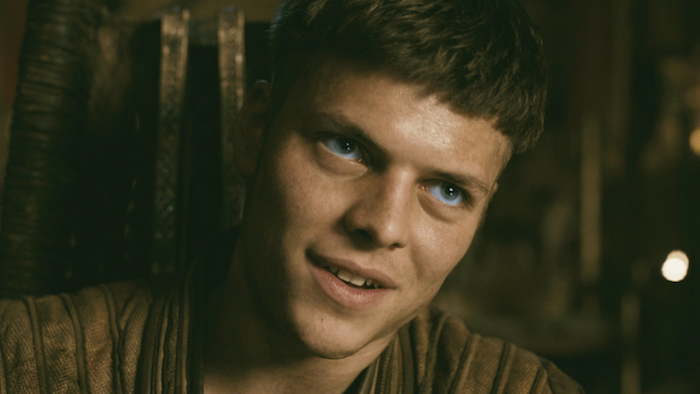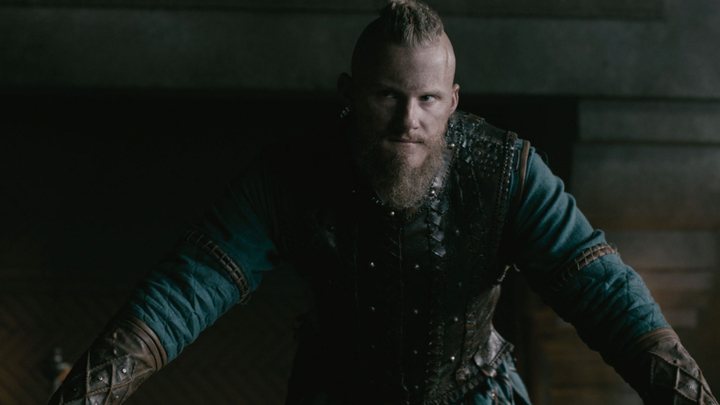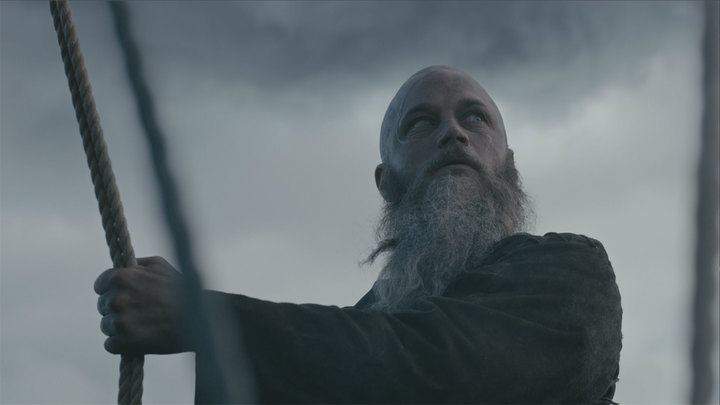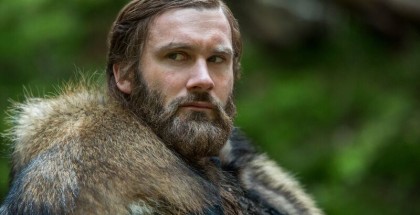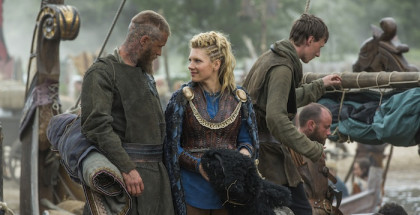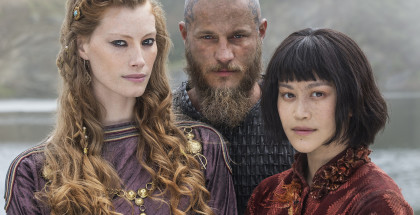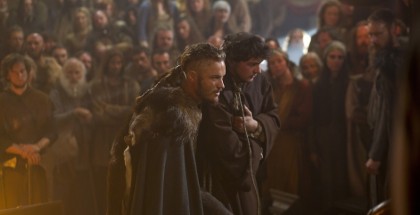UK TV review: Vikings Season 4, Episodes 11, 12 and 13
Review Overview
Old faces
8New adventures
8Generational drama
8David Farnor | On 22, Dec 2016
Warning: This contains spoilers.
France. England. Kattegat. And now, talk of sailing across the Mediterranean. As Vikings returns for its second half of Season 4, its scale has never been bigger – but the first three episodes remind us that the show’s strength lies not its epic ambitions, but its family drama.
The two have rarely been so finely balanced by Michael Hirst’s programme. After an uneven Season 3, Season 4’s first 10 episodes pitted Ragnar and Rollo against each other with renewed intensity, as Clive Standen’s shunned brother came out on top of Travis Fimmel’s ruthless farmer. Even the fact that, almost for the first time, we could truly sympathise with Rollo, a traitor to the Viking way, more than King Lothbrok was a sign of how much the series had matured. The mid-season finale’s time-jump, then, was a tad concerning, as it seemed to uproot all that was working to introduce Ragnar’s sons instead. A brief glimpse of Hvitserk (Marco Ilsø), Sigurd (David Lindström), Ubbe (Jordan Patrick Smith) and Ivar (Alex Høgh Andersen) made you question whether the show had the acting chops, the writing nuance and the storytelling heart to make it work. The initial steps of Episodes 11, 12 and 13, though, are a reassuring sign that we’re in safe hands.
Hirst has always been concerned with legacy and family more than individuals – a fact borne out by his last time-jump in Season 2 that gave us a grown-up Bjorn. And, just as Alexander Ludwig has grown into his role over the ensuing two years, there’s a sense in these few hours that Ragnar’s other sons are doing the same.
“Who wants to be king?” That was the challenge laid down by Ragnar at the mid-season break and, while our glimpse of the contenders was disappointingly brief, we spend more time with them now. Episode 11 introduces each one in a nifty scene where they struggle to outdo each other with axes and bows – there’s never any doubt about their battle skills. The other thing they seem to have in common is that they no longer believe that Ragnar is favoured by the gods, not in the way that, say, Loki does. Ivar is the only one who seems to love him – so it’s no surprise when he is the sole son to agree to go with him on a journey to England. That, after all, is why Ragnar has returned: to wreak vengeance upon King Ecbert in Wessex.
Ivar is “The Outsider” of Episode 11’s title, something that Hirst depicts by showing them all having a thing for blond slave Margrethe (Ida Nielsen). They seem happy to share her between them all, but Ivar sits to the side and watches – something that’s almost as creepy as the sons having their way with the slave in the first place. When Ivar does get his chance to try his own luck, he can’t get it up. His reaction speaks volumes: he decides to kill her and spare the shame of the others discovering. She convinces him not to, but the rest inevitably don’t believe his claims of prowess in the sack. The seeds of disunion have been sown.
Bjorn, meanwhile, has other concerns: he wants to sail into new waters, into Europe’s Mediterranean to visit the great Rome. Ludwig is better than he ever has been here, moving with a newfound confidence that says a lot about his authority in Kattegat. He’s a convincing leader, not least because he can get people to follow him, as Ragnar once did. Ragnar, on the other hand, has to dig up old treasure to pay veteran fighters to sail with him.
There’s a nice echo between Bjorn and Ragnar, as he, like his father, finds himself questioned by followers when things go wrong. Sailing to Frankia to beg Rollo’s permission to pass along the country’s coasts without harm, they’re all thrown in prison instead, stoking discontent among the men. Unlike Ragnar, though, Bjorn is proven right: Rollo, it turns out, was just killing time until his own men had been summoned with a bigger map of where Bjorn wants to go – and a condition that he be allowed to travel with them.
Bjorn, then, is and isn’t his father’s son – he wants glory, not land to farm – and you can see the similarities and differences in the way he talks, sighs, glares and, when imprisoned, stays silent and ponders what his options are.
Fimmel’s Ragnar, by contrast, has never looked older or frailer. How cruel that history will not remember his name – or will at least question its veracity – as much as Ivar’s and Bjorn’s and the others. As we begin to see the show shift away from one age of Lothbrok rule to another, it’s revealing that Hirst deliberately chose Ragnar as his entry point to set up his saga; he’s figure of pathos and humility, as history moves on without him, and it’s rich territory to explore. Bjorn goes to the Seer to ask what his father’s return means. The ancient prophet says it will bring calamity. Or, to be more specific, calamities, plural. Ragnar’s return isn’t just interesting from a character perspective, but is also full of intriguing portent, portent that, in retrospective, wasn’t possible without that time-jump.
Ragnar, of course, is the show’s other Outsider, not in Kattegato reunite, but to bid farewell all over again, if Bjorn and Floki will give him ships. They say yes. After all, they’ve got their own plans, now, and they don’t involve him – an important step for Floki. He shouts his love to Ragnar, as Fimmel walks away, but, for once, the unhinged Floki, who became a one-note anti-Christian tirade in Season 3 (poor Athelstan), doesn’t depend on others to have a character. Ragnar repays favour, and well he might; this is Floki at his most well-rounded.
Floki hints that they’ll meet one day in Valhalla, but Ragnar is unsure – after all, he’s been denied access to heaven before in his dreams. The question, for us, is less whether it will happen and more whether he wants it to. In one shocking, tragic moment, Ragnar tries to hang himself, only for ravens to pick apart the noose tied to a tree. Ragnar, now, is a lost figure – the time between the season’s halves have literally been taken away from both him and us, the audience – but he’s also a less arrogant one. How fitting that his plans, like Bjorn’s, should seem to fail in Episode 12, as Aslaug’s premonitions of Ivar dying at sea almost come true, with Ragnar’s troops washed ashore by a storm. Even now, there are still depths to him worth plundering.
We get a brief scene with Lagertha (the always-excellent Katheryn Winnick) to remind us of that, as the former husband and wife make up to some degree. But Lagertha’s real plans do not involve him, but Kattegat, as she (and her new lover, Astrid) plan to overthrow Aslaug and take control of the city. It’s an unexpected step for the shield-maiden-turned-earl, as part of her brilliance was in her ability to be so magnanimous and understanding of her husband and his infidelity – arguably, in those times, it was pretty common for men to have multiple women, so perhaps it’s harder to judge her actions from our perspective.
What hasn’t changed, though, is the fun of seeing Lagertha kick butt: she and her fighters seize Kattegat efficiently, forcefully and by killing as few of the people as possible (classic Lagertha). She’s even more convincing at leading than Bjorn, and, after seeing Kalf and Sigvard wrong her over several seasons, we’re in no doubt that she deserves to have her own kingdom.
If Winnick remains thrilling to watch, credit must also go to Alyssa Sutherland for making her Princess Aslaug so enjoyably loathsome. Her interactions with Lagertha during a sacrificial ceremony, as well as her exchanges with her sons give her a more layered presence; Ubbe, who came from their affair, is less doting than the needy Ivar, although we soon determine she is just as dependent upon the cripple, and that he is tired of being her mother’s boy. Ragnar, meanwhile, who has since had another affair Kwenthrith (or so we’ve been told), seems to be accepting and forgiving Aslaug (who had her own fling with Harbard, you may recall). “Thank you for letting them love me,” he says to her of their children.
Also still showing signs of love is Rollo, who, like Bjorn, is similarly preoccupied with building some kind of legacy. Yes, he’s got a beautiful wife and charming sons (one sticking their tongue out at Loki is a season highlight), he’s made something of himself in Paris, but he’s still-part Viking, he confesses. He still hears Thor in the thunder – a line that’s delivered beautifully by Clive Standen. Like Ragnar’s sons, Rollo still has affection for his former family, and him arguing about that with Gisla (the superb Morgane Polanski) is great to watch; how well-realised this Frankia part of the story has become, after its shaky beginnings with cheesy court politics. It’s almost as well-realised as Rollo’s selfish streak, which he just can’t shake. We’ve gone from disliking to fearing to sympathising and now back to disapproving of Rollo again; he’s a sad figure who gets better and better.
The real stars, though, are Ivar and Ragnar, our outsiders, who team up to lead the expedition to Wessex. The chance to see them together highlights how well Alex Høgh Andersen has nailed his role down, not just physically in terms of his crawling and grabbing to move about, but in his Travis Fimmel-like glances and smiles. In Ivar’s company, Fimmel’s familiar smirk and glint also return – the old Ragnar is still in there somewhere. There have been decades of character development squeezed into these seasons and Travis conveys them all without breaking into a sweat.
Ragnar, of course, brings out his fatherly guns, dishing up advice for his son – but that advice (remember the dark portent) only leads to nasty places, as they elect to butcher all of their gang to avoid being discovered by Ecbert’s search parties. Ragnar encourages Ivar, reminding him that he should accept who he is, not try to be normal but embrace the fact that his immobile legs make him stronger, both in person and in other departments. We see the disturbing consequences of that, as he proves just how good he is at silently killing people in the dark, rolling between the beds in their camp without making a noise, gleefully cutting their throats. Calamity is on the cards, indeed.
The promise of Lagertha and Ragnar wreaking personal revenge is certainly satisfying, but will that close off those narrative loops by the season’s end, leaving us to focus on Bjorn and Rollo’s Roman holiday? There are dark times ahead, to be sure, but the way these generations of Vikings continue to interact is still lighting up the screen. Season 4’s second half delivers on its mid-season cliffhanger, building an impressively weighty historical epic. Well played, Vikings. Well played.
Vikings: Season 4 Part 2 is released every Thursday on Amazon Prime Video, as part of a £5.99 monthly subscription. Seasons 1 to 3, plus Season 4 Part 1, are also available.
Photo: History


